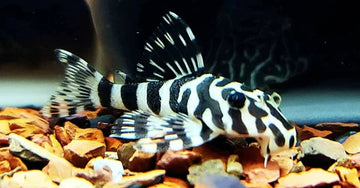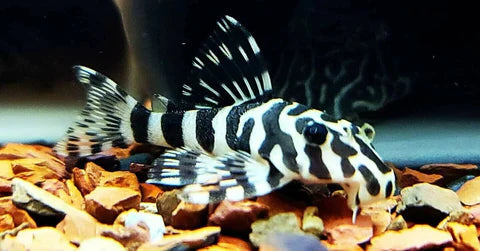L134 Leopard Frog Pleco (Peckoltia compta) – 3-4 cm
-
Estimated Delivery:Jan 17 - Jan 21
-
UPS Next Day Air Shipping Charges 65$

L134 Leopard Frog Pleco (Peckoltia compta) – 3-4 cm
A beautifully patterned armored catfish with bold black stripes or spots set against a yellowish or creamy body, forming an eye-catching leopard-like design. Juveniles typically show banded patterns that evolve into spots as they mature.
Natural Habitat:
Native to the fast-flowing, oxygen-rich rivers of the Amazon basin in Brazil—especially Tapajós and Jamanxim tributaries. Prefers clear, warm waters with moderate to strong current.T
-
Tank Setup:
-
Minimum tank size: 30 gallons (≈120 L) for a single pleco; 55 gallons or more if housing multiple individuals.
-
Use fine sand or smooth gravel substrates, with plenty of caves, driftwood, and rocks to offer hiding spots and replicate natural refuges.
-
Provide moderate to strong filtration and water flow to mimic riverine conditions and support high oxygenation.
-
-
Water Parameters:
-
Temperature: 24–30 °C (75–86 °F), with optimal range around 26–28 °C.
-
pH: 6.0–7.5; water hardness: 2–15 dGH.
-
-
Diet:
-
Omnivorous—needs a mix of high-quality sinking pellets or wafers, plus protein-rich foods like frozen bloodworms, brine shrimp, or mysis. Offer occasional vegetables like zucchini, cucumber, or spirulina wafers.
-
-
Behavior & Tankmates:
-
Generally peaceful and nocturnal. May be shy initially, but will become more active once settled.
-
Can become territorial with other bottom-dwellers or same-species individuals unless given ample hiding spaces. Best kept singly or in large aquaria with sufficient cover.Plant-friendly, but may nibble soft plants like Java fern—floating plants can provide shade.
-
-
Lifespan:
-
Expect 8–10 years, with proper care; some reports suggest even longer lifespans are possible.
-
-
Breeding:
-
Cave spawner: males guard eggs within rock or driftwood caves. Breeding may be triggered by slight drops in water temperature and increased water flow.
-

